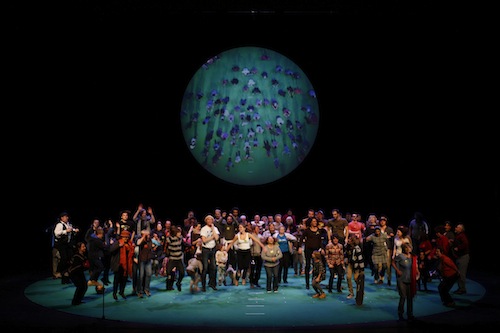100% Melbourne: part theatre, part game, part reality
ACCLAIMED Berlin theatre makers Rimini Protokoll have cast 100 everyday Melbourne folk in an unusual piece of theatre this weekend. Amanda Yap checks out 100% Melbourne.
Acclaimed Berlin theatre makers Rimini Protokoll have partnered with the City of Melbourne to present 100% Melbourne this weekend – a unique part-theatre, part-game, part-reality performance.
Described as a “living, breathing portrait of Melbourne”, 100% Melbourne is Protokoll’s first Australian effort whereby 100 Melburnians will take to the stage, genuinely answering questions posed to them as a group – painting a live performance of the habits and behaviours of Melbourne as a city.
Helgard Haug, Stefan Kaegi and Daniel Wetzel, who make up Remini Protokoll, are among the leaders and creators of the theatre movement known as “Reality Trend” (Theater der Zeit), which has exerted a powerful influence on the alternative theatre scene.

Remini Protokoll has attracted international attention with their dramatic works, which take place in that colourful zone between reality and fiction.
But unlike Protokoll’s previous projects – 100% Berlin, 100% Vancouver and 100% Vienna – 100% Melbourne differs primarily in how the performers have been cast. Just one person was cast for the project, while the rest of the participants were recruited via a “chain reaction”, a self-casting process that was controlled by a series of search criteria.
100% Melbourne Associate Director Bec Reid explains the calibration of five broad statistical criteria developed from national census data – age, gender, region of birth, residential location and family composition – ensured a true demographic profile of Melbourne could be found.
[youtube]http://www.youtube.com/watch?v=2RIH67B7n2c&feature=youtu.be[/youtube]
“We discussed the casting of the first person with Rimini Protokoll, and they made a decision that it would be really great to start with a researcher, with somebody who knew numbers really well,” Reid says.
“Since we were working with the City of Melbourne research team who helped us with statistics and finding the right information, we thought we would invite one of the researchers on the team to become person number one.”
After the first person was cast, the performer recommended another person from his circle of friends according to those criteria. She then had 24 hours to secure that next person and so on.
“They kept recommending like that, until we got to 100 people. It’s a complete ‘chain reaction’,” Reid explains.
“When you come into the project, you know that person that recommended you, and you also know the person that you recommended – this means that when you are on stage, there at least two people you know.”
While it was initially quite easy to recommend anyone as the huge range of criteria could easily be met, Reid described the difficulties of the casting process towards the end, as criteria specifications narrowed down and so did the type of people they were looking for.
“I really had to encourage people to think naturally about who they are connected with in their community, who they could recommend and then bring into the project,” she says.
Each person in the show is a “percentage point” and showcases one strand of the diverse make-up of Melbourne, representing approximately 41,000 other people just like them, based on the search criteria. Reid uses gender as a simple example, saying that the show’s cast is made up of 50 males, and 50 females, as “Melbourne is 50% male and 50% female”.
Using age as another easy example, Reid says nine per cent of Melbourne’s population are under the age of five, represented by the nine toddlers in the show.
“The youngest in the cast is one, and the oldest is eighty-eight. It’s intergenerational, it’s culturally and linguistically diverse – you name it, we’ve got it in the show.”
Yet, interestingly enough, no international students will be making an appearance in the show.
Reid says, “We thought we would capture that part of the community of Melbourne, but it’s one of those things that occur because of the self-determining casting processes.”
“I was asking participants if any of them had a connection to an international student from Northeast Asia, or Southern Central Asia, anywhere but while we do have people from those parts of the world who are in the 50 to 75 year old age range, they are not students,” she continues.
“It just depends on who people know, and who says ‘yes’ to the project when I contact them.”
Nevertheless, there is no doubt that the huge cast of 100% Melbourne will ensure some sort of relevance, as audience members will be looking at themselves, at a portrait of the city as adorned by those numbers and statistics “in a biographical, anecdotal way”.
As mentioned earlier, participants will be answering all sorts of questions ranging from the death penalty to their stance on gay marriage, from their favourite sandwich to the bus they take, during the show. An open-mic session will also be held, when audience members will get a chance to raise their own questions to the cast members.
Reid says “everybody does introduce and talk about themselves a little bit – individual stories come out as people talk more about themselves.”
“It’s quite revealing but they’re not performing as such – these are just a hundred people being themselves.”
100% Melbourne will be showing this Friday May 4 and Saturday May 5 at 7.30 pm, and on Sunday 6 May at 6 pm, at the Melbourne Town Hall, Swanston St. Tickets are available online and prices range from $15 for concession to $55 for a family ticket.



